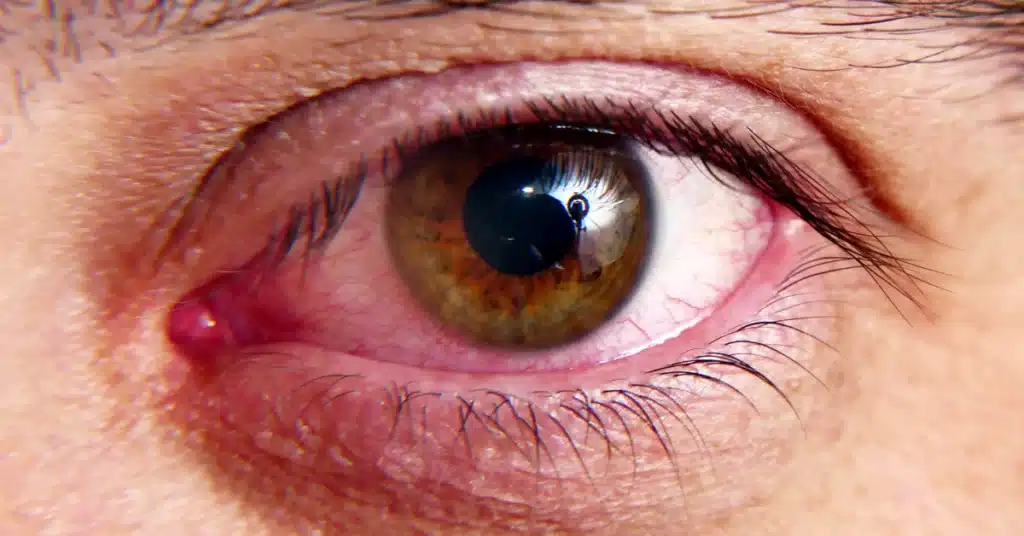Having dry and itchy eyes can be a bothersome and not-so-fun experience.
Still, it’s important to know that these pains can sometimes be early signs of several eye diseases.
Eyes that are dry and itchy are often a sign of Glaucoma and Dry Eye Syndrome.
There are, however, many other things that can cause this pain.
In this article, we’ll talk about why your eyes are dry and itchy and give tips on stopping these annoying feelings.
Understanding Dry Itchy Eyes
Dry Eye Syndrome, or ocular surface disease, causes dry, itchy eyes due to insufficient or poor tear production.
Tears are important for keeping the front area of the eye healthy and for seeing clearly.
When the eyes can’t make enough tears or dry out too fast, it can make them feel dry and itchy.
Want to know more about the Dry Eyes Allergy? Read our article: Understanding Dry Eye Allergy: Causes, Symptoms, and Treatment
Symptoms of Dry Itchy Eyes
 Source: bunyaritklinsukhonphotos
Source: bunyaritklinsukhonphotosDry Eyes, which is also known as Dry Eye Syndrome in medicine, are usually caused by not making enough tears.
This means that either your eyes aren’t making enough tears or the ingredients in your tears aren’t balanced.
Tears are made up of water, snot, and fatty oils. Together, they make a thin layer that covers the eye’s surface and protects it from getting infections or damage from the outside world.
If your eyes feel dry instead of itchy all the time, you should see your doctor to see if you might have Dry Eye Syndrome.
Listed below are some of the symptoms of Dry Itchy Eyes:
- red eyes
- light sensitivity
- watery eyes
- blurry vision
- stringy mucus near the eye
Dry Itchy Eyes cause
Many different underlying reasons can cause your eyes to become dry and itchy.
However, Glaucoma and Dry Eye Syndrome are the most common and well-known reasons for eye pain.
If you have either of these eye diseases, your eyes might get dry and itchy. Let’s take a quick look at these situations.
Dry Eye
Dry Eye Syndrome, also called Keratoconjunctivitis Sicca, is an eye condition that happens when your eyes don’t make enough tears.
Because the eyes aren’t getting enough lubrication, this deficiency can cause pain and swelling.
Luckily, this problem can be dealt with. To treat Dry Eyes, eye doctors may suggest several effective dry eye medicines and eye drops that contain Cyclosporine.
People with Dry Eye Syndrome need different treatments, depending on their unique eye condition and how bad it is.
Glaucoma
People who have Glaucoma and people who have dry, itchy eyes both have bad eye pain.
Glaucoma is a dangerous disease that can make your eyes dry and itchy. Also, eyes that are dry and itchy can sometimes be a sign of Glaucoma.
The two conditions have something in common: both Dry Eyes and Glaucoma can cause pain and make it hard to see.
If you don’t treat these signs immediately, Glaucoma can cause permanent vision loss, so it’s important to watch them.
Glaucoma and Dry Itchy Eyes can be found and treated more quickly if you get regular eye exams and talk with a doctor.
And see the changes yourself!
Itchy Dry Eyes treatment
 Source: pixelshot
Source: pixelshotItchy and dry eyes are often signs of more serious health problems, like Glaucoma and Dry Eyes Syndrome.
Treating these conditions can help ease the pain of itching and Dry Eyes. Glaucoma and Dry Eyes Syndrome can be managed in several ways.
For Glaucoma, doctors can suggest several eye drops and pills that can be taken by mouth to control the condition.
In more serious cases, surgery may be suggested to lower the pressure inside the eye and keep vision loss from Glaucoma from happening.
If someone has Dry Eyes Syndrome, their eye doctor may prescribe eye drops and tablets to treat the symptoms.
So, it’s important to see your trusted eye doctor to get effective treatment for any medical conditions that might be causing your eyes to feel dry and itchy.
Conclusion
Understanding the reasons, symptoms, and treatments for Dry Itchy Eyes is crucial for keeping your eyes healthy and comfortable.
Eyes that are dry and itchy can be problematic. Still, they can also indicate serious eye problems, especially Glaucoma and Dry Eye Syndrome.
If you don’t fix these conditions, they can cause pain, vision problems, and permanent vision loss in the case of Glaucoma.
It is very important to get regular eye exams and talk to doctors to find and treat these problems quickly.
People with Dry Itchy Eyes can get relief by getting effective treatment, which is also good for their eye and general health.
Frequently Asked Questions
What causes dry and itchy eyes, and can they be signs of more serious eye conditions?
Dry and itchy eyes can result from various factors, which might indicate the presence of eye conditions like Glaucoma and Dry Eye Syndrome. Early detection is essential for timely treatment.
What are the key symptoms of Dry Eye Syndrome, and how is it treated?
Symptoms of Dry Eye Syndrome include redness, light sensitivity, watery eyes, and blurry vision. Treatment often involves prescribed eye drops such as Restasis and, in severe cases, oral medications containing Cyclosporine.
How is Glaucoma related to dry and itchy eyes, and what are the potential consequences of untreated Glaucoma?
Glaucoma is a well-known eye condition that can cause dryness and itchiness. Dry and itchy eyes can sometimes indicate the presence of Glaucoma. If untreated, Glaucoma can lead to permanent vision loss as well.
What is the significance of regular eye exams in managing Glaucoma and Dry Eye Syndrome?
Regular eye examinations and consulting a doctor are vital for the early detection and effective management of both Glaucoma and Dry Eye Syndrome. Timely treatment can ease pain and prevent vision loss.
How can I find effective treatment for dry and itchy eyes, and when should I consult an eye specialist?
To seek relief from Dry Itchy Eyes, consult a trusted eye specialist. Depending on the underlying medical conditions and severity of symptoms, they can recommend tailored treatment options, such as eye drops, oral medications, or surgery.
When referencing outside resources, GoodrxMedicine always provides full citations. To learn more about the measures we use to maintain the quality of our content, please review our Content Information Policy.











